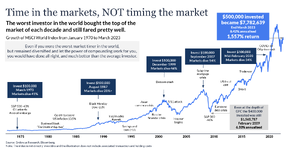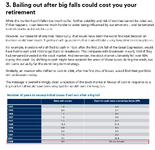Yeah, the VIX is really high at the minute, it's pretty nasty.
But, what is putting me off is all the people who are talking like that are saying "the market is fundamentally sound", but all they're doing there is basing that on data from when before Trump took over, Trump could make that very much not sound, very easily. Things won't be sound with 25% tariffs, that's going to hurt everyone and then when Tesla can't sell a car as his target market hates him and when others like Nvidia have their own problems with DeepSeek or whatever.
There's now a 35% chance of a US Recession this year, and the S&P 500 is still trading at a P/E of 29, so it's still expensive. This could get a lot worse before it starts to get better.
It's just a case of whether it continues to sink, which it certainly can do, or it rebounds off this. Maybe all the tariff talk is temporary bluff to allow Trump to bend the rules and gain some pro-US outcomes, but I don't think Trump is that smart.
I'm debating whether to just continue the dollar cost averaging each month (maybe even change to each week), and see this through to the bottom, or whether just to park any extra in bonds or whatever.
I still think mid term AI is going to be key to making so many things much more efficient, so I still think we're on the up as a whole, but this could be a really nasty bump in the road.
Interesting post
To answer some of your points - the market is sound to me, because demand is solid to strong for many products and services, US unemployment is low and not increasing, there is lots of liquid money floating about looking for a home, Trump is likely to cut US taxes to increase demand further, interest rates to me are low in the USA and falling. People can borrow 10 year loans at 4.22% today, just below long term US inflation, US dollar is still quite highly valued, GDP in US still quite high. Tariffs come today and go tomorrow what does that say? To me its says they are, in general temporary and he is playing games. He will not want to damage the stock market.
The risk of recession could come from say people borrowing to buying stuff like Bitcoin and Tech Stocks and then losing money and panic selling. In US people do this sort of thing and its almost unknown in Britain. Bitcoin, TESLA and Nvidia are all well down in the last 2 months. In the 1920s US investors bought too many shares, borrowing to do so and creating a massive bubble in 1929. When prices dropped lots of Americans felt much poorer and stopped spending.
Trump only came in on Jan 20th so it will take time for data to come in, but I don't here stories of panic in the USA in the last 7 weeks. The dollar would be falling quite quickly if the US economy was struggling. It has fallen a bit about 5% - panic I would say is over 20%.
If you think AI is the future, don't you think Nvidia will do well, even with Chinese competition?. I heard recently NVidia was on a P/E of 22 which says its a cheaper than average share. I tend to buy Technology Investment Trusts because you are buying their brains and a good spread of technology. They have lost me money recently, but had also allowed me to retire early. They look value now but were over valued. Everyday I read and hear about how technology is entering our lives and how it actually dominates the lives of many people now even when they don't want it to. My advice is diversify a bit from Tech too, for example land , people will always need it and value it in its different forms - residential housing, leisure, offices, storage, food production, forestry and its reducing.
I am a fan of pound average costing and regular saving - if you leave it alone it takes some of the emotion away, particularly emotional swings. I am finding it harder to see bottom and tops!
I reviewed this yesterday, now, for modest new monthly SIPP contribution
50% Ruffer Investment (anti-share fund - Gold, Inflation linked bonds - a balance for tech shares)
25% Liontrust European Dynamic (Cont. Europe is cheap, war is forcing govt spending)
25% Jupiter Asian Income (Asia is cheap and growing fast)



